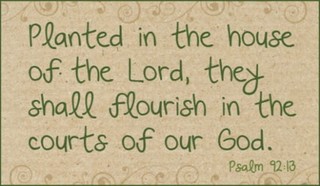
- Recent Translations
- All Translations
Psalm 92
Share
Settings
Thanksgiving to Yahweh for Victory
A psalm. A song. For the Sabbath day.
1 [It is] good to give thanks to Yahweh, and to sing praise concerning your name, O Most High;Psalm 92 Commentary
Chapter 92
Praise is the business of the sabbath. (1-6) The wicked shall perish, but God's people shall be exalted. (7-15)
Verses 1-6 It is a privilege that we are admitted to praise the Lord, and hope to be accepted in the morning, and every night; not only on sabbath days, but every day; not only in public, but in private, and in our families. Let us give thanks every morning for the mercies of the night, and every night for the mercies of the day; going out, and coming in, let us bless God. As He makes us glad, through the works of his providence for us, and of his grace in us, and both through the great work of redemption, let us hence be encouraged. As there are many who know not the designs of Providence, nor care to know them, those who through grace do so, have the more reason to be thankful. And if distant views of the great Deliverer so animated believers of old, how should we abound in love and praise!
Verses 7-15 God sometimes grants prosperity to wicked men in displeasure; yet they flourish but for a moment. Let us seek for ourselves the salvation and grace of the gospel, that being daily anointed by the Holy Spirit, we may behold and share the Redeemer's glory. It is from his grace, by his word and Spirit, that believers receive all the virtue that keeps them alive, and makes them fruitful. Other trees, when old, leave off bearing, but in God's trees the strength of grace does not fail with the strength of nature. The last days of the saints are sometimes their best days, and their last work their best work: perseverance is sure evidence of sincerity. And may every sabbath, while it shows forth the Divine faithfulness, find our souls resting more and more upon the Lord our righteousness.
Psalm 92 Commentaries
Footnotes 7
- [a] The Hebrew Bible counts the superscription as the first verse of the psalm; the English verse number is reduced by one
- [b] The Hebrew's "[that] I have moistened with fresh oil" seems unlikely. The above translation presupposes the loss of a letter in the Hebrew textual tradition (ballotani for the MT's balloti)
- [c] This word for "enemies" suggests those watching for any advantage
- [d] Hebrew singular, but used as a collective. The verbs of this verse are also singular
- [e] Or "temple"
- [f] This is the same word used of the oil in v. 11 and translated "fresh"
- [g] According to the reading tradition (Qere)
Chapter Summary
INTRODUCTION TO PSALM 92
\\<>\\. Many of the Jewish writers {a} think that this psalm was written by the first man Adam, and so the Targum, ``a hymn or song which the first man said for the sabbath day.'' But had it been a composure of his, one would think it should have been placed at the head of this collection of psalms, and before that of Moses, Psalm 90, besides there were no musical instruments then for this psalm to be sung on, as in Ps 92:3, for they say it was made by him quickly after his creation, and his ejection from paradise; for Jubal was the father of them that handle the harp and organ; nor were there any number of enemies and wicked men to rise up against him, as in Ps 92:7,9,11. Nor was it written by Moses, as others have thought; but rather by David, to whom the Arabic version ascribes it; the musical instruments, the number of enemies, and the mention of the house and courts of the Lord, best agree with his times. It was made for the sabbath day, and to be used upon it; and directs to the work and worship of it; praising of God and celebrating his works, attending his house and ordinances; even for the seventh day sabbath, which God instituted and appointed the Jews to observe; and which in David's time was religiously kept; though some understand this of the time of rest which David had from his enemies round about him, and apply it to all such times of rest from tyranny and persecution, which the church of God in any period enjoys; and which is a proper season for praise and thanksgiving. Some Jewish writers refer it to the world to come, which will be all sabbath, even to the days of the Messiah, as Jarchi and others; so Theodorot; see Heb 4:9.
